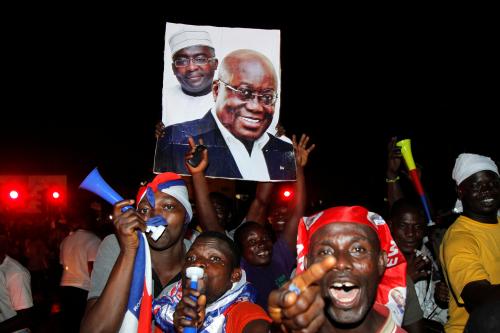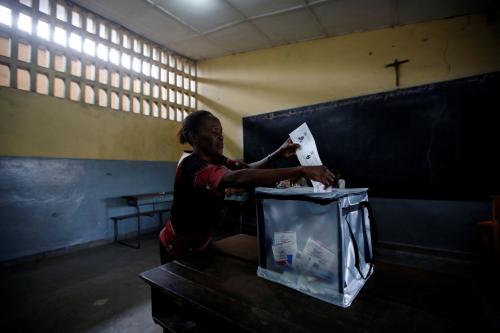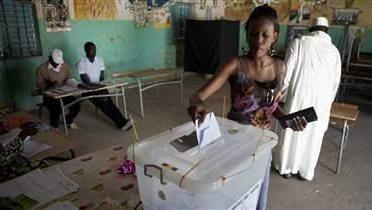Editor’s note: For more on African political transitions, see our interactive African Leadership Transitions Tracker, which presents changes at the head of state level in every African country from independence or end of the colonial period to the present.
Africa has gone through a number of leadership transitions in 2016 and with each one the edifice that will shape Africa’s leadership and political transition process is being molded. 2016 has been another of year progress on the African leadership transition front. This year there have been 16 elections, in seven of the elections there was an effective leadership transition and over 60 percent of the elections were conducted in a free and transparent manner with satisfactory citizen involvement and little or no unrest—such as in Ghana or Cabo Verde. Overall, the leadership transitions have been largely peaceful, constitutional, and transparent. However, the experiences across countries and sub-regions have been quite varied and provide us with many lessons for the future. I will use Gabon, Gambia, and Ghana (the “three Gs”) to illustrate these experiences.
Three elections, in Gabon in August, and the Gambia and Ghana in December, are shaping the narrative of this dynamic process and providing important lessons for the transition process. First, the struggle for change continues: While Africa is slowly moving towards more participatory political transitions, the fight has not completely won. In addition, the growing importance and maturity of electoral commissions; citizens’ increasing awareness that their votes matter; the slow but certain move away from tribal politics to issues politics; and now regional, rather than foreign, ownership around leadership transitions all contribute towards the deepening of democracy on the continent. Each of the countries—Gabon, the Gambia, and Ghana—have tackled these issues differently.
The struggle for change persists
Ghana is the pride of Africa when it comes to democratic transitions. Once again, its most recent election has proven this point. Despite the tense and intensely fought campaign both parties continue to pledge respect for the process. Indeed, there is much to celebrate around Africa’s leadership transitions, but much remains to perfect the process the continent over. This year many elections were held freely and fairly on the continent, and both incumbents and new leaders were elected to office—including Benin, Cabo Verde, São Tomé and Príncipe, and Zambia for example. And in an unprecedented move the President of Mauritania and Angola all declared they will not seek re-elections at the end of the term. A very positive and encouraging trend if the pronouncements come to pass.
However, in a number of countries the old has not given way to the new, and the evolution of democracy is still in motion with too-often deadly consequences for the citizens in Burundi, Gabon, and the Gambia to name a few. These examples demonstrate that the concept of leadership transition has not yet been fully adopted. A number of lessons can be drawn from these latter experiences. The populations are increasingly more vocal about transparency of elections. Both sides incumbent and opposition have increasingly equal chances of getting their voices heard and results tend to be closer in these countries. There is still a need for vigilance, and the tendency to slip remains. Peaceful leadership transitions are not yet the norm.
Election commissions: Strong, credible, and independent institutions are emerging
In the three Gs, the role of the electoral commissions has been a determining factor. In fact, electoral commission heads are increasingly becoming the new villains and/or heroes in the African struggle for peaceful leadership transitions.
In Gabon, the head of the electoral commission’s independence was largely questioned primarily by the opposition and the people of Gabon, as well as international election observers. Notably, the final results of the election were not announced by the head of the electoral commission, as constitutionally stated, but by the minister of the interior—an institution with no independence from the incumbent. Gabon’s incumbent President Ali Bongo won by 49.9 percent over 48.2 percent for his rival Jean Ping, less than a 6,000 vote difference and suspiciously high turnout in Bongo’s home province. Violence and protests erupted not long after the announcement.
The Gambia’s electoral commission performed and fared much better: Three months before the election, the head of the electoral commission Alieu Momarr Njai pledged in a memorable but unpublicized speech to uphold the integrity of the commission and protect the integrity of the process. During the launch of the electoral process he said:
Election results may be rigged to predetermine who will win or lose, and election may be disrupted, casting doubt on the legitimacy of the process, but I stand here today to pronounce to you that, as far as our concerted efforts are in play, this will never be the case in our dear country. The Independent Electoral Commission believes that an election without integrity subverts the purpose of a democratic election, and cannot be considered fair and equitable. The IEC will ever concentrate on conducting free and fair elections. This, I believe we will ever achieve by upholding governing principles such as: respect for principles of electoral democracy; ethical conduct; accuracy and transparency.
The people of the Gambia and many others did not expect such clarity of vision from the head of the electoral commission, and many dismissed this as normal election propaganda. However, Njai kept his word. He pronounced the elections results in favor of the opposition candidate Adama Barrow and called for President Yahya Jammeh, who has been in power for over 22 years, to step down, eliciting pride and jubilation from the people of the Gambia. The Gambia’s troubles have instead come from Jammeh’s withdrawal of his concession and determination to stay in power.
In Ghana, the head of the election commission benefitted from a robust and solid system, which has a history of inclusion, transparency, and most of participation by all members of the political exercise. The continuous process undertaken by the Ghanaian electoral commission to continuously educate the electorate and the political parties is clearly a lesson for the rest of the continent on how to build trust and interact with the population.
However, even in Ghana there are lessons to learn from the election, such as how to manage delays in the announcement of the election results and or glitches in the system on election day. In Ghana the commission needed more time to ensure everyone eligible to vote had voted and to count the votes. Tensions began to mount as the population waited for the elections results to be proclaimed, both sides began proclaiming victory and the supporters of each candidate began filling the streets.
This could have led to severe unrest. However, the communication of the election committee head asking the people for patience while all the votes were counted was an example of good election management. The people could only heed to this request because of the trust built by the commission and a legitimate sense of ownership of the commission. Therefore, while independently elected, the first task of every election commission is to build trust with the people. As African countries prepare for more elections this should be an area that gets special attention.
Ownership: The people’s voice, the continent’s voice
Ethnic politics is slowly giving way to issues politics. The economy is taking center stage in elections. In Ghana, as in the Gambia, the last few years have seen citizens suffer under the weight of weakening currencies, erosion of purchasing power by over 50 percent, increasing poverty, joblessness, and interest rates above 25 percent. Similarly, the rise of corruption, noted by Ghanaian President John Mahama in his concession speech, undermined all the achievements of Mahama presidency—and most of all his struggle to give affordable and reliable power to the people of Ghana. The results of these elections increasingly show that while there will always remain a thread of local politics in elections, the electorate is becoming more sophisticated and are voting on issues broader than ethnic origins. Citizens are more engaged and are owning the election agenda.
African leaders are also increasingly more active in the resolution of African leadership transition issues. During the crisis period of the Gabon elections the French and the European Union were the most active and vocal voices. The French president called for a recount and the EU asked that all results be published, but Chadian President Idriss Déby, as head of the African Union, was the central mediator of the proceedings. In the case of the Gambia, the African Union alongside five other presidents of ECOWAS[1] countries have taken it upon themselves to mediate a settlement of the impasse. The acknowledgement and ownership of the transition agenda by Africa’s leaders is an important part of assuring peace and stability during transition crises. The cases of Burundi and the Gambia should provide lessons on how to make such negations successful. What incentives could be put in place to minimize difficult transitions?
As the Ghanaians celebrate the peaceful election of new President Nana Akufo Addo, as President Bongo of Gabon settles into his second term, and as the Gambians wait anxiously for a resolution, the continent must heed the lessons of these three transitions and begin putting in place systems that allow citizens more ownership of the process, ensure that election commissions are truly independent and equipped to build trust with citizens, and encourage candidates that acknowledge the increasing sophistication of the electorate so campaign messages must have content and can no longer rely solely on identity politics.
[1] Economic Community of West African States






Commentary
Africa’s mixed political transitions in the 3 Gs: Gabon, the Gambia, and Ghana
December 22, 2016